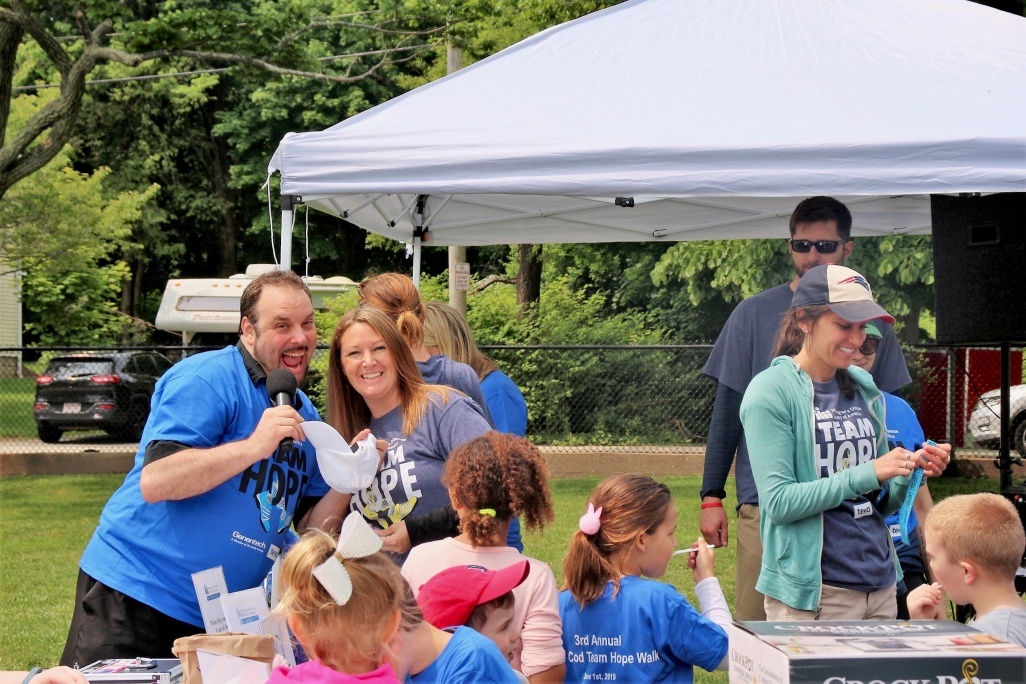
By Rich Harbert (rharbert@wickedlocal.com)
PLYMOUTH – A wave of blue swept up and down the rail trail in North Plymouth recently as the third annual Huntington’s Disease Walk stepped off from Nelson Park.
More than 130 men, women and children participated in the event, which raises awareness about the disease while raising money to help find a cure.
Supported by raffle prize donations from businesses throughout town, this year’s event exceeded its goal, raising more than $12,000 for HD research and support for families.
Huntington’s disease is a fatal genetic disorder that causes the progressive breakdown of nerve cells in the brain. It deteriorates a person’s physical and mental abilities usually during their prime working years and has no cure.
Every child of a parent with HD has a 50/50 chance of inheriting the faulty gene that causes the disease. There are approximately 30,000 symptomatic Americans and more than 200,000 at-risk of inheriting the disease. The symptoms of HD are described as having ALS, Parkinson’s and Alzheimer’s diseases – simultaneously.
Elizabeth Callahan helped organize this year’s event and walked with members of her family along the 3-mile course, up and down the rail trail in North Plymouth.
Callahan lost her grandmother and two uncles to the disease, and one of her cousins was recently diagnosed with it.
But there is hope. Clinical trials are underway in several cities, and Callahan’s own sister is helping to drive the search for the cure.
Sarah Hernandez dedicated her life toward finding a cure after learning she and her cousins had a chance of inheriting the disease, when she was just 12. Hernandez works with a team looking for a cure at the University of California at Irvine. While relatives back home were walking June 1, Hernandes was in Italy at a conference on the disease.
Callahan said the walk is as much about raising awareness about the disease as it is about raising money.
“We hope that there a cure, but we’re also doing it to raise awareness of the disease and make the community aware that people are suffering from it,” Callahan said.
Money raised during the annual walk, as well as similar walks across the country, helps fund the research. It is also used to support people living with the disease and their families.
It funds support groups, social workers, a helpline and youth camps. The money also funds 47 Center of Excellence clinics across the country, which provide care to people with HD from a team of clinicians that specialize in the disease.
The group sponsors local education days, an annual three-day convention, and free publications and webinars, and advocates at local and national level to change laws so that HD patients can get easier and faster access to disability payments.
PLYMOUTH – A wave of blue swept up and down the rail trail in North Plymouth recently as the third annual Huntington’s Disease Walk stepped off from Nelson Park.
More than 130 men, women and children participated in the event, which raises awareness about the disease while raising money to help find a cure.
Supported by raffle prize donations from businesses throughout town, this year’s event exceeded its goal, raising more than $12,000 for HD research and support for families.
Huntington’s disease is a fatal genetic disorder that causes the progressive breakdown of nerve cells in the brain. It deteriorates a person’s physical and mental abilities usually during their prime working years and has no cure.
Every child of a parent with HD has a 50/50 chance of inheriting the faulty gene that causes the disease. There are approximately 30,000 symptomatic Americans and more than 200,000 at-risk of inheriting the disease. The symptoms of HD are described as having ALS, Parkinson’s and Alzheimer’s diseases – simultaneously.
Elizabeth Callahan helped organize this year’s event and walked with members of her family along the 3-mile course, up and down the rail trail in North Plymouth.
Callahan lost her grandmother and two uncles to the disease, and one of her cousins was recently diagnosed with it.
But there is hope. Clinical trials are underway in several cities, and Callahan’s own sister is helping to drive the search for the cure.
Sarah Hernandez dedicated her life toward finding a cure after learning she and her cousins had a chance of inheriting the disease, when she was just 12. Hernandez works with a team looking for a cure at the University of California at Irvine. While relatives back home were walking June 1, Hernandes was in Italy at a conference on the disease.
Callahan said the walk is as much about raising awareness about the disease as it is about raising money.
“We hope that there a cure, but we’re also doing it to raise awareness of the disease and make the community aware that people are suffering from it,” Callahan said.
Money raised during the annual walk, as well as similar walks across the country, helps fund the research. It is also used to support people living with the disease and their families.
It funds support groups, social workers, a helpline and youth camps. The money also funds 47 Center of Excellence clinics across the country, which provide care to people with HD from a team of clinicians that specialize in the disease.
The group sponsors local education days, an annual three-day convention, and free publications and webinars, and advocates at local and national level to change laws so that HD patients can get easier and faster access to disability payments.
